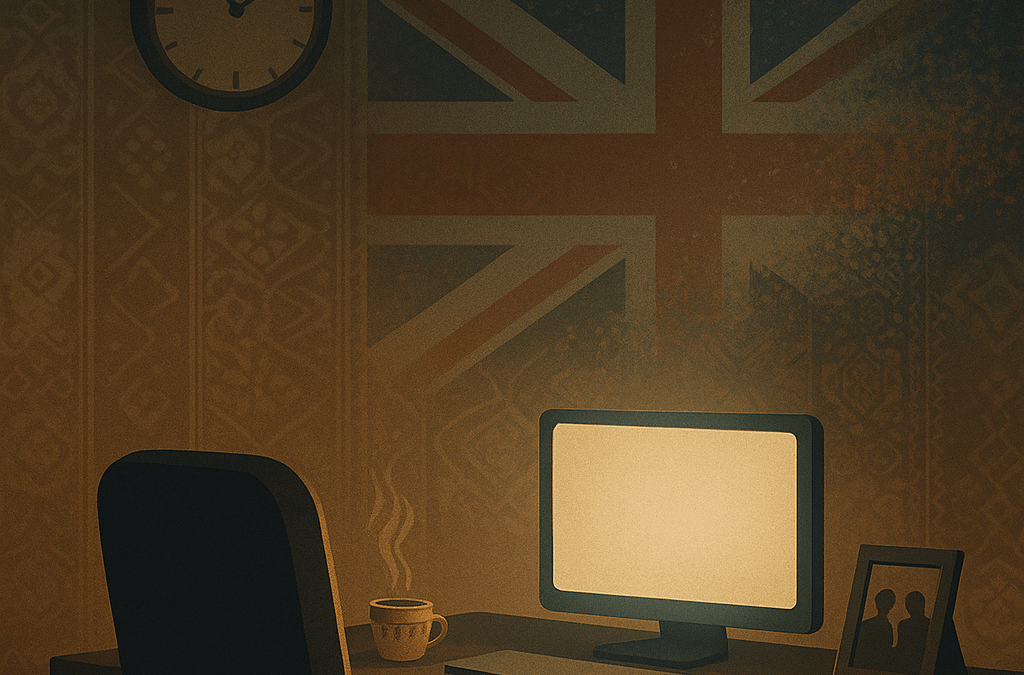
by Soniya Basu | Jul 15, 2025 | Mental Health & Wellbeing
Over the last year, the UK has seen a silent shift in workplace behaviour, especially among its South Asian diaspora. Quiet quitting, once a viral TikTok trend, has now become a lived reality for thousands of British South Asians, who feel increasingly disillusioned with their jobs, the promises of social mobility, and systemic inequities.
This quiet exodus isn’t just personal “it’s political”. And it’s happening at the same time the UK government unveils its latest White Paper on Workforce and Immigration Reform (2025), which signals deeper changes ahead.
What Is Quiet Quitting?
Quiet quitting isn’t about quitting your job. It’s about quitting the hustle. It’s when employees mentally check out, stop going above and beyond, and stick strictly to their job description. The goal? Survival, not advancement.
For many South Asians, this resonates deeply.
Why Is It Hitting South Asians Hard?
✦ The Illusion of Meritocracy
Many South Asians come from a culture that glorifies education, hard work, and respectability politics. But despite degrees and dedication, they still face barriers due to their names, accents, or skin colour. The system isn’t always fair, and over time, it chips away at trust.
✦ Economic Exhaustion
From £4,000 salaries that vanish into rent and bills to punishing commute times, the UK’s high cost of living is no longer balanced by job security or financial growth. For first-generation immigrants and their children, the dream of a better life often turns into a paycheck-to-paycheck grind.
✦ Cultural Disconnection at Work
“Friendly, not friends” — many South Asians report feeling isolated at work, despite being surrounded by people. Lack of community, performative diversity policies, and subtle biases leave them feeling unseen, despite ticking every box.
What the UK White Paper Means
The UK White Paper on Immigration and Workforce Reform (July 2025) introduced:
- ❌ Removal of care worker sponsorships
- 📈 Increased Skilled Worker thresholds
- ❓ Ambiguous future for international students post-graduation
These policies disproportionately affect the South Asian community, many of whom work in the care sector, IT, or come to the UK on graduate routes.
The government’s shift toward a “high-skilled, low-volume” migration model sends a clear message: contribute more or stay out.
Read UK Immigration Rule Changes – What You Need to Know (July 2025).
What Comes Next?
✅ A Wave of Career Re-evaluation
Expect more South Asians to pivot toward entrepreneurship, remote work, or relocation. The idea of climbing the UK corporate ladder no longer holds universal appeal.
✅ Community-Led Support Systems
Groups like ScottishIndian.com are helping people find culturally relevant support, from mental health resources to career advice. This shift from institutional reliance to peer-powered networks is only growing.
✅ Cultural Reconnection
Quiet quitting isn’t just burnout—it’s a return to values. South Asians are seeking meaning, not just money. That means prioritising family, wellness, and even considering moving back to India or other countries with better work-life balance.
Quiet quitting is not laziness. It’s a symptom. Of disillusionment. Of invisible ceilings. Of being told to be grateful while being passed over.
As immigration rules tighten and workplace expectations rise, South Asians in the UK are making a powerful, quiet statement:
“I’ll still work. But not for your illusion.”
✅ Ready for a career shift? Check out our latest jobs board tailored for UK-based South Asians exploring better work-life options.

by Soniya Basu | Jul 10, 2025 | Mental Health & Wellbeing
What if every crack told a story—and every flaw made you more valuable? In a world obsessed with perfection, the Japanese art of Kintsugi offers a powerful reminder that brokenness can be beautiful. This centuries-old pottery repair technique doesn’t hide cracks — it highlights them with gold.
That’s the essence of Kintsugi (金継ぎ), a centuries-old Japanese art of repairing broken pottery with gold, silver, or lacquer. Rather than hiding imperfections, Kintsugi embraces them—highlighting each fracture as a unique part of the object’s journey.
What Is Kintsugi?
Kintsugi (literally “gold joinery”) is a technique that dates back to 15th-century Japan. When a beloved ceramic bowl broke, artisans would piece it back together using lacquer mixed with powdered gold, silver, or platinum.
The result? A gleaming network of golden seams that not only restore the vessel’s function but elevate its beauty.
Instead of hiding the damage, Kintsugi celebrates the breakage—each repair becoming part of the object’s visual and emotional story.
Much like our spotlight on Indian dolls and folk craftsmanship, Kintsugi celebrates heritage, perfection, and artistry.
A Philosophy, Not Just a Technique
Kintsugi is deeply tied to wabi-sabi, the Japanese worldview that finds beauty in imperfection, impermanence, and simplicity.
It teaches:
- Breaks are not flaws, they are part of the form.
- Repair is an act of care, not concealment.
- Resilience can be visible and beautiful.
In an age of instant replacements and cancel culture, Kintsugi whispers something more human: “You are not ruined. You are reborn.“
More than just a pottery technique, Kintsugi is a spiritual philosophy rooted in Japanese aesthetics and Zen mindfulness.
Why the Japanese Art of Kintsugi Resonates Today
Kintsugi has exploded in popularity beyond Japan and not just among ceramicists. Therapists, mindfulness coaches, and artists now use Kintsugi as a metaphor for healing, trauma recovery, and personal growth.
You may break. But you can be pieced back together—stronger, wiser, more beautiful than before.
While traditional Kintsugi requires lacquerware skills, modern Kintsugi kits are available with epoxy, gold powder, and brushes.
It’s a meditative, mindful practice. Many people now attend Kintsugi workshops not just to fix plates, but to slow down, reflect, and embrace imperfection.
Kintsugi is:
- A craft you can learn
- A ritual of acceptance
- A practice of patience
Kintsugi: Broken Yet Beautiful – A Metaphor for Life
From fashion to mental health awareness, Kintsugi motifs are everywhere:
- Designers use golden crack patterns in clothing and jewellery
- Mental health campaigns use Kintsugi as a metaphor for recovery
- Tattoo artists ink Kintsugi-style seams as symbols of resilience
What started as pottery repair is now a global philosophy of healing.
Kintsugi aligns with mindfulness practices we explored in our guide to Desi self-care and mental wellness.
Kintsugi isn’t just about fixing a cup.
It’s about seeing beauty where others see damage.
It’s about honouring the story of what has been broken and lovingly made whole again.
In your own life, what would happen if you treated your scars not as shameful, but sacred?
Maybe it’s time we all lived a little more like Kintsugi pottery: whole, broken, and golden at the seams.

by Soniya Basu | Apr 28, 2025 | Ayurveda, Mental Health & Wellbeing, Wellness & Healing
Ayurveda, the ancient Indian system of medicine, emphasizes the importance of “Desha,” or geographical location, in influencing health. Desha considers how environmental factors impact our well-being. This article analyses the Ayurvedic concept of Desha, particularly Anupa Desha, and draws comparisons with UK geography, providing practical dietary and lifestyle advice to mitigate Vata imbalance, a common concern in the UK.
Understanding Anupa Ayurveda Desha
Ayurveda describes three main types of Desha:
- Jangala Desha: Dry land, characterized by fewer trees and water.
- Anupa Desha: Marshy land, with abundant trees, mountains, and water bodies like rivers and the sea.
- Sadharana Desha: Normal land, possessing a balance of features.
People inhabiting Anupa Desha are described as having tender bodies and are more prone to Kapha and Vata disorders.
UK Geography and Anupa Desha
🌍 While the UK is not directly referred to as Anupa Desha in Ayurveda, its climate shows close similarities. ❄️💨
🌧️ The UK experiences long winters, extreme cold, persistent winds, heavy rainfall, and damp conditions, making it prone to Kapha and Vata vitiation.
🌊 Coastal proximity, abundant rivers, and historically marshy lands further strengthen this correlation, as moist environments tend to aggravate Kapha, while cold and windy conditions disturb Vata.
Personal Experience: Vata Imbalance high in UK
🌬️ Cold & Windy Climate – The UK’s cold, dry air increases Vata, leading to imbalance. ❄️💨 🍽️ Dietary Habits – Too many raw, dry, processed foods can worsen Vata, lacking warmth and nourishment. 🥗⚡ ⏳ Lifestyle Stressors – Work pressure, financial concerns, irregular routines, and excessive screen time overstimulate Vata. 📱😵💫
Many individuals in the UK, including myself, experience symptoms related to Vata aggravation.
Vata-Related Health Concerns
🦴 Musculoskeletal Issues – Joint pain, stiffness, arthritis, and osteoporosis may develop. 🏃♂️💢 🧠 Nervous System Disorders – Anxiety, insomnia, headaches, nerve pain, and tremors can arise. 🛌🌡️ 💨 Digestive Problems – Bloating, constipation, and dry colon issues are common signs of imbalance. 🍽️❌ 🩸 Circulatory Issues – Poor circulation, cold hands and feet, and fatigue may manifest. ❄️🩸 🌀 Mental & Emotional Effects – Forgetfulness, feeling scattered, fear, and insecurity can be linked to Vata aggravation. 🤯💭
🔹 Dry skin and premature aging 🧴⌛ 🔹 Tinnitus (ringing in ears) 🔊🎵 🔹 Weight loss when severely aggravated ⚖️💨 🔹 Dry cough and respiratory issues 🌬️🤧
These issues are often exacerbated by the UK’s limited sunlight, especially during the colder months, leading to widespread Vitamin D deficiency disorders.
Ayurveda Desha Approaches to Vata Balance
Ayurveda doesn’t directly mention Vitamin D, but it explains the conditions associated with its deficiency through Vataimbalance and low Ojas (vitality). Here’s a combined approach:
- 1. Supplements (UK Market):
- The NHS and Ayurveda recommend Vitamin D supplementation, especially from October to April.
- Popular options in the UK include Vitabiotics Ultra D3 (1000 IU), BetterYou Vitamin D3 Spray, Holland & Barrett Vitamin D3, and Solgar Vitamin D3 1000-2000 IU.
- While the NHS recommends 10 mcg/day (400 IU), many safely take up to 1000 IU/day unless otherwise advised.
- 2. Vitamin D-Rich Foods:
- While sunlight is limited, certain foods can help:
- Fortified cereals: Enjoy warm with milk and seeds.
- Fortified plant milks (Alpro, Oatly, Rude Health): Combine with warming spices.
- Eggs (yolk): Cook with ghee or olive oil.
- Fatty fish (salmon, sardines, mackerel): Excellent for joint health.
- Mushrooms (UV-exposed): Cook with turmeric and ginger.
- 3. Protein-Rich Foods (Balancing Vata):
- Include protein sources like pulses (moong dal, toor dal, masoor dal, chickpeas), tofu/tempeh, paneer, Greek yogurt (plain, room temperature), fish, eggs, nuts (almonds), and seeds (pumpkin, flax, sunflower). These are readily available in UK stores like Goldenacre Minimart, Scottish Grocers. Tesco, Asda.
- 4. Lifestyle Tips for Vata Balance:
- Sunlight: Get outdoor sunlight between 10 am and 2 pm when available. ☀️
- Oil Massage (Abhyanga): Perform daily oil massage before bathing to nourish joints and skin. 💆♀️
- Warmth: Wear layered clothes and use heating pads for joints. 🔥
- Hydration: Stay hydrated with warm water and herbs like ginger or fennel. 🫖
- Oil Application: Apply oil (sesame or coconut) before bathing, especially for numbness and stiffness. Karpooradi Thailam can also be used.
- Epsom Salt Baths: At Night Apply oil in Hands and Legsif you are prone to numbness, Soak in warm water with Epsom salt before bed. 🛀
- Exercise and Yoga: It is very essential to practise exercise and yoga for mobility, as joints and bones tend to get stiff in this climate. Aim for at least daily walking, gym workouts, or activities like Zumba to stay physically active and maintain joint flexibility.
Dietary Recommendations for Vata and Kapha Balance in the UK
To balance Vata and Kapha, focus on incorporating these foods, commonly found in UK markets:
- Foods to Reduce Vata:
- Vegetables: Carrots 🥕, sweet potatoes 🍠, beetroot, asparagus, courgette, okra, green beans.
- Fruits: Ripe berries, peaches 🍑, plums
- Other: Unsalted butter, ghee-sautéed foods.
- Foods to Reduce Kapha:
- Vegetables: Leafy greens (kale) 🥬, broccoli 🥦, cabbage, cauliflower, peppers 🫑.
- Fruits: Apples 🍎, Pears
- Spices: Ginger, garlic, and turmeric are beneficial for both Vata and Kapha.
- General UK Foods that help in Vata and Kapha Balance:
- Grains: Cooked oats, rice (basmati)
- Legumes: Lentils, chickpeas
- Dairy: Warm milk, ghee
- Nuts and Seeds: Almonds, flaxseeds, sunflower seeds
- Oils: Olive oil, sesame oil
- Herbs and Spices: Cinnamon, cardamom, black pepper
Ayurveda’s concept of Desha provides valuable insights into how geographical factors influence health. While the UK differs from the classical Anupa Desha, it shares some characteristics that can predispose individuals to Vata and Kaphaimbalances. By understanding these influences and adopting appropriate dietary and lifestyle practices, including Vitamin D supplementation, a protein-rich diet, and the use of warming, grounding foods and practices, UK residents can promote better health and well-being.
Be slow in choosing, sure in living – Choose Ayurveda.

by Soniya Basu | Apr 11, 2025 | Mental Health & Wellbeing, Student Life
🧘♀️ Balancing Academic and Personal Life: Self-Care Tips for Students
(Because you can’t pour from an empty coffee cup ☕)
Let’s be real — uni life is a lot. One minute you’re attending lectures, the next you’re scrambling to meet a deadline, figuring out how to cook edible maggi, and trying to remember what “free time” felt like.
Balancing academic pressure and personal life can feel like a constant juggling act. And when you’re living abroad or away from family? Even harder. But the good news? Self-care isn’t just bubble baths and Netflix (though that helps). It’s small, daily choices that protect your energy, focus, and mental health.
Here’s how you can find balance and stay sane — while still slaying your coursework.
🎯 1. Set Realistic Academic Goals Students
Let’s start with academics — because that’s what you came for (and what you’re paying for 🫣).
- Use the Pomodoro technique (25 mins study, 5 mins break) to stay productive without burning out.
- Break down big tasks into mini goals. “Start essay” becomes “read 1 article,” “write intro,” “proofread.”
- Prioritize tasks using To-Do apps like Notion, Google Keep, or even a good ol’ sticky note wall.
✨ Pro Tip: Perfection is the enemy of done. Submit the assignment — even if it’s not 100%.
🧠 2. Make Time for Mental Health
Your mind deserves care, just like your body.
- Say no when you’re overwhelmed. Protect your peace.
- Practice deep breathing, journaling, or mindfulness apps like Headspace or Calm.
- Reach out. Most universities offer free counselling services and mental health support.
💡 Feeling low isn’t weakness. It’s human. You’re not alone, and help is always available.
🍝 3. Feed Yourself as Students (More Than Just Instant Noodles)
Yes, uni life gets hectic — but skipping meals or living off takeout won’t help your focus or energy.
- Plan simple, healthy meals: rice + dal, pasta + veggies, sandwich + fruit.
- Meal prep on Sundays (or whenever your energy peaks).
- Stay hydrated — your brain needs water, not just caffeine.
Bonus: Cooking for yourself = low-key therapy.
🧍 4. Protect Your Personal Time (Without Guilt)
You’re more than your grades. Make space for the things that make you you:
- Go for walks, read something fun, binge your comfort show, or just vibe with music.
- Stay connected with friends and fam — even if it’s just a “miss you” voice note.
- Join a club, society, or group that aligns with your vibe. (Cultural societies = built-in support system!)
🌈 Balancing academic and personal life is an art — not a formula. You don’t have to hustle 24/7 to prove your worth. The real flex? Passing your course and staying emotionally okay.
So breathe. Eat. Laugh. Study. Rest. Repeat. That’s self-care. That’s balance.
Looking for more student life hacks and wellness tips? Follow scottishindian.com for relatable guides and community vibes that keep you grounded — wherever you are in your journey. 💛

by Soniya Basu | Apr 11, 2025 | Mental Health & Wellbeing, Student Life
🧠 Accessing Mental Health Resources as an International Migrant
(Because moving countries is brave — but also a lot)
Let’s be honest — starting a new life in a new country is a big deal. You’re figuring out work, housing, culture, accents, maybe even snow for the first time ❄️ — and it’s totally normal to feel a mix of emotions.
As international migrants, we often carry a “be strong” mindset. But here’s the truth: mental health is just as important as finding a job or paying rent. If you’re feeling anxious, isolated, or overwhelmed — you’re not alone, and there is help out there.
💬 Step 1: It’s Okay to Ask for Help
No matter where you’re from, we get it — in many cultures, mental health isn’t openly talked about. But here in the UK, the conversation is growing, and there are real resources that are free, private, and available to everyone — yes, even if you’re not a citizen yet.
Whether it’s culture shock, loneliness, job stress, or past trauma — your feelings are valid, and you deserve support.
🏥 Step 2: Start with Your GP (Local Doctor)
If you’re registered with a GP (General Practitioner), this is the best starting point. You can:
- Book an appointment and talk openly
- Ask to be referred to a mental health service
- Get support for anxiety, depression, panic attacks, sleep issues, and more
💡 Not comfortable in English? Ask for a translator — it’s your right, and it’s free.
📞 Step 3: Use Free Mental Health Helplines (No NHS Registration Needed)
Whether you’re waiting for an appointment or just need someone now:
- Samaritans (24/7): Call 116 123
- Shout (Text Support): Text SHOUT to 85258
- Mind UK: mind.org.uk — mental health guides in multiple languages
- NHS 111 (urgent help): Free to call and available 24/7
None of these will ask about your immigration status. You are safe here.
🌍 Step 4: Explore Community-Led and Cultural Support
Many communities offer support groups, helplines, or workshops in your own language. These can feel safer and more familiar if you’re unsure where to begin.
Follow local Facebook or WhatsApp groups to stay updated or visit your local cultural center.
📱 Bonus: Mental Health Apps for Low-Key Support
If you’re not ready to talk to someone just yet, try:
- Headspace – guided meditations
- Calm – for stress and sleep
- Wysa – AI chatbot + human support (private + free version available)
- Togetherall – anonymous community space (often free through local councils)
Mental health matters — no matter your postcode, passport, or accent. You’re allowed to ask for help. You deserve to feel supported. And you’re not alone on this journey.
Check out Scottish Indians for more — where community, care, and conversation come together. 💚

by Soniya Basu | Apr 10, 2025 | Mental Health & Wellbeing, Student Life
(Because burnout isn’t a personality trait, okay?)
Moving to a new country to study is exciting — new people, fresh starts, cooler weather (hello UK rain 👋). But let’s be honest, it can also be a lot. New academic expectations, homesickness, culture shock, group work with strangers — it’s enough to make anyone want to cry in the library toilets.
Here’s a chill, no-judgment guide to dealing with academic pressure and managing stress while studying in the UK — especially if you’re far from home.
🎓 The Academic Culture Shock Is Real
In the UK, universities expect you to:
- Think independently
- Read a lot outside lectures
- Write critically, not just copy textbook facts
- Submit essays with fancy referencing styles (Harvard who?)
If this feels overwhelming, you’re not alone. Most international students take time to adjust. It’s not about being smart or not — it’s just a new system.
🤯 Signs You Might Be Stressed (That You Might Miss)
Stress doesn’t always look like panic attacks. Sometimes it’s:
- Avoiding assignments because “I’ll start tomorrow”
- Always feeling tired, even after sleeping 10 hours
- Random crying over missing your mum’s dal
- Feeling isolated, even in a room full of people
If any of this sounds familiar — hey, you’re human. Let’s talk about how to deal.
🧘♀️ 1. Find Your Calm (Even If It’s Just 10 Minutes)
You don’t need to sit cross-legged under a tree to meditate (unless that’s your thing). Try:
- Breathing exercises using apps like Headspace or Calm
- Stretch breaks during long study sessions
- Short walks in nature or even just around campus
- Digital detox for 30 mins a day (yes, that includes Instagram)
Little resets > burnout meltdowns.
👥 2. Academic Pressure Talk It Out
Bottling up = pressure cooker vibes. Try this instead:
- University counselling (free and confidential!)
- Peer mentors or student advisors
- Whatsapp groups or Discord communities with other international students
- Calling home just to hear a familiar voice (no shame in that)
Talking doesn’t make you weak — it’s actually one of the strongest things you can do.
📝 3. Plan Smart, Not Hard to Deal Academic Pressure
Overwhelm often starts with “I have too much to do and no time.” Fix that with:
- To-do lists (Notion, Trello, or even paper sticky notes)
- Pomodoro technique (25-min focus, 5-min break)
- Breaking tasks down — “Start essay” becomes “Read 1 article” → “Write intro” → “Add references”
Trust us, small wins are still wins.
Adjusting to academic pressure in a new country is hard — but you’re not alone, and you’re not failing. You’re adapting, learning, growing (even if it doesn’t always feel like it). Use the tools your uni provides, be kind to yourself, and remember: mental health is just as important as grades.





